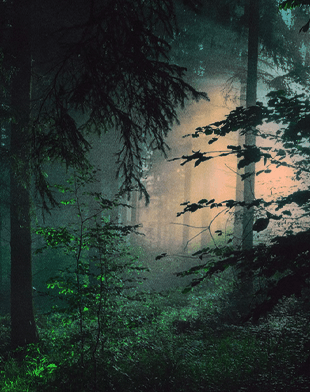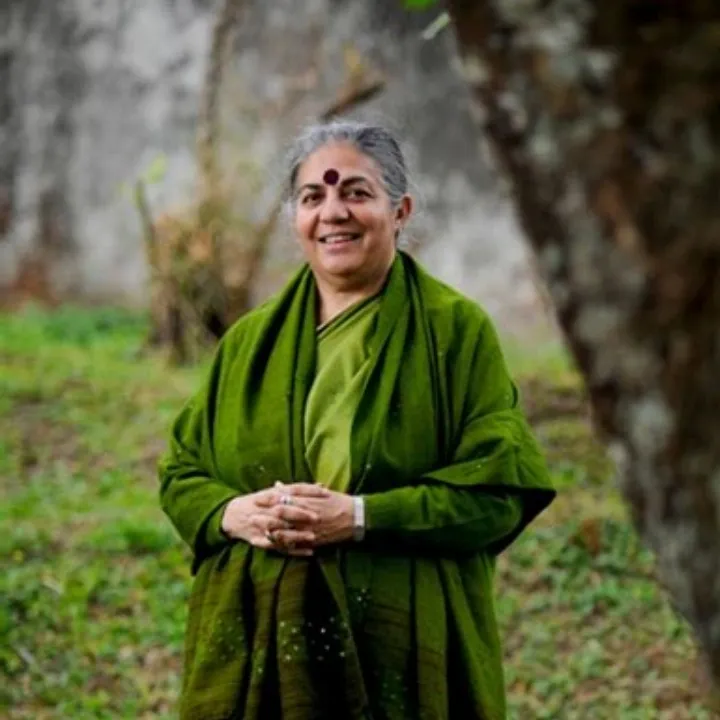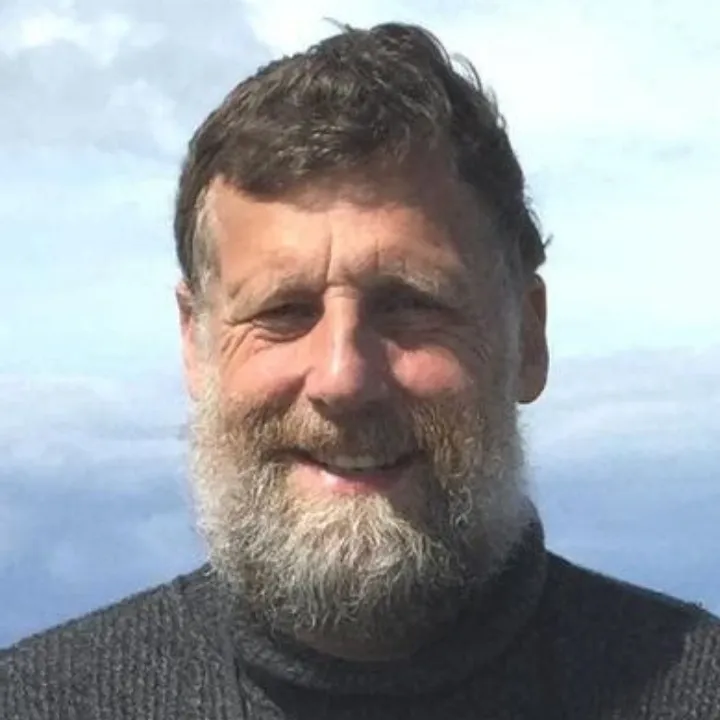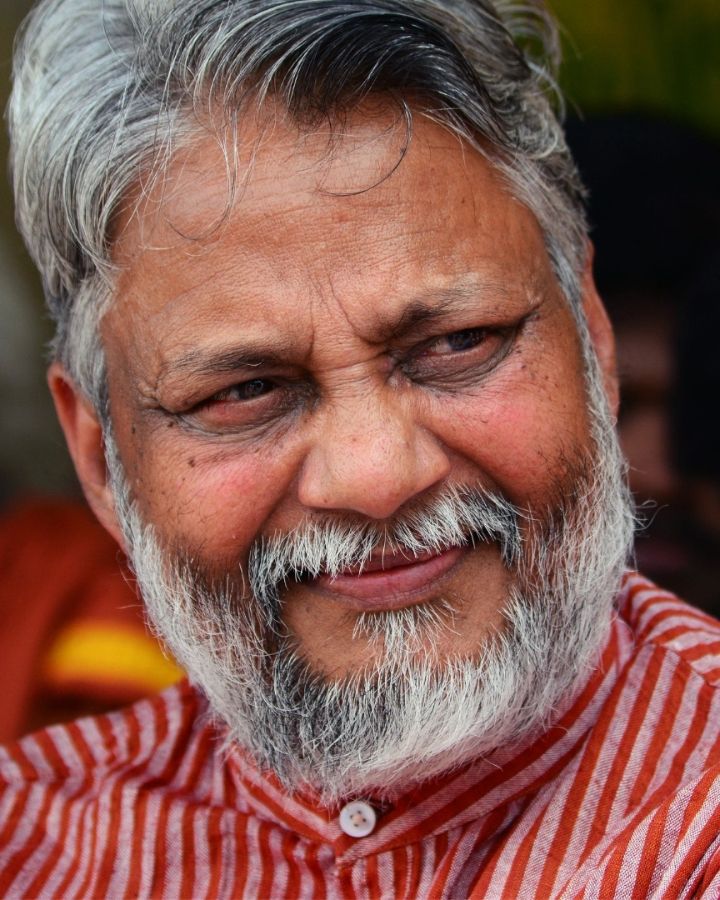Forest Guardians Become a forest guardian and learn from teachers and leaders from over 30 nations
Explore the sacred relationship between humans and forests, discovering the vital role of forest guardians in ecological stewardship and balance.
taught by Nicolas Salazar Sutil
We ask "why and how do we transform the way we live with trees?" Learn what forests have to teach us about alternative systems that foster planetary health, why a connection to place and memory is vital in the global movement for land and climate justice, and the role that Indigenous Peoples play in knowin...
We examine who plants and trees are from embodied perspectives. We focus on building personal relationships with plants, drawing on somatic and spiritual approaches (Qi Gong), and exploring the potential held in animal-human relationships. We also explore the medicinal properties held in forests, their pro...

Chapter 1
Freediving in South Africa's Kelp Forests With Swati Foster

Chapter 2
Q&A With Swati Foster

Chapter 3
Somatic Awareness With Eline Kieft

Chapter 4
Q&A With Eline Kieft

Chapter 5
Tore Dance, Ouricuri Rituals and Embodying the Forest in the Karirí-xoco Tradition With Tawanã Cruz, Hosted by Nicolas Salazar Sutil

Chapter 6
Indigenous Media Communication With Yanda Twaru

Chapter 7
Strengthening Alliances With Haru Kuntanawa

Chapter 8
Q&A With Yanda Twaru, Tawanã Cruz and Haru Kuntanawa
We focus primarily on Gaelic knowledge of plants, herbs and soil, and the importance of knowing your land and forests. The module builds on the preceding learning to focus on well-being and medicinal connections between humans and plants, and the importance of trees and soil in the affirmation of a sense o...

Chapter 1
Ancestral Connection and Ancient Woodlands of Britain With James Canton

Chapter 2
Ancestral Connections to the Yew Tree With Charlotte Pulver

Chapter 3
Q&A With James Canton and Charlotte Pulver, Hosted by Ruby Reed

Chapter 4
Spiritual Properties of Trees With Glennie Kindred

Chapter 5
Knowing Ancestral Lands With Angharad Wynne

Chapter 6
Q&A With Glennie Kindred and Angharad Wynne, Hosted by Christabel Reed

Chapter 7
Guerilla Rewilding With Sioned Jones
Ancestral forests and traditions are essential to re-imagining a future where humans and trees can cohabit harmoniously. In what ways does ancestral knowledge inform the way future treescapes are being imagined, specifically in relation to iconic forests such as the great Siberian Forest and the Boreal For...

Chapter 1
Embodied Relationships to Trees With Julia Adzuki

Chapter 2
Ancestral Practices in Siberia With Andrey Laletin

Chapter 3
Q&A and Ceremony With Julia Adzuki and Andrey Laletin, Hosted by Ruby Reed

Chapter 4
A Collective Sentience: Listening and Learning Among the Aspen Groves With David Abram

Chapter 5
The Ecology of Plants in a Climate Emergency With Natasha Myers

Chapter 6
Q&A With David Abram and Natasha Myers, Hosted by Christabel Reed and Nicolas Salazar Sutil
Cultural practices affirm ethical and ecological relations to land and forest. Song, story, dance and other cultural and creative practices are vital to an experiential and lived-in understanding of how we can care for trees, and how forests transform human society.

Chapter 1
Forest Protection in Chile With Alex Melinir, Hosted by Nicolas Salazar Sutil

Chapter 2
Traditional Forest Knowledge With Chaz Doherty

Chapter 3
Q&A with Alex Melinir and Chaz Doherty, Hosted by Nicolas Salazar Sutil

Chapter 4
Spirit of Country, Songlines and Dreaming Tracks With Dinnawhan White

Chapter 5
The Blue Mountains and the Importance of Local Politics With Rosemary Dillon, Hosted by Juan Francisco Salazar

Chapter 6
Q&A With Dinnawhan White, Rosemary Dillon and Juan Francisco Salazar, Hosted by Ruby Reed
In this module, we learn how traditional ecological knowledge can form the basis of action and community organisation to defend endangered forests. We explore frameworks for environmental activism and rights of nature that draw on Indigenous Forest Knowledge.

Chapter 1
Land Grabs in Liberia With Alfred Brownell and Radiatu Haja Sheriff-kahnplaye

Chapter 2
Q&A With Alfred Brownell and Radiatu Haja Sheriff-Kahnplaye, Hosted by Christabel Reed and Nicolas Salazar Sutil

Chapter 3
Legal Victories in Kenya With Daniel Kobei

Chapter 4
Food Justice in Tanzania With Janet Maro, Hosted by Anna Mdee

Chapter 5
Q&A With Daniel Kobei and Janet Maro, Hosted by Christabel Reed
How do communities work together to manage and protect soils, plants and forests? How are human-tree relations held together and how does justice guide the process? What can forest carers learn from Indigenous Wisdom grounded on biocentric values? We will explore Indigenous struggles for land justice in Pe...

Chapter 1
Defending the Arariboia Forest in Brazil With Flay Guajajara, Hosted by Nicolas Salazar Sutil

Chapter 2
Protecting Acre From Logging With Adeildo Shawakaya Shawãdawa, Hosted by Nicolas Salazar Sutil

Chapter 3
Rights of Nature in Brazil With Vanessa Hasson, Hosted by Nicolas Salazar Sutil

Chapter 4
Environmental Journalism in Paraguay With Aldo Benitez, Hosted by Nicolas Salazar Sutil

Chapter 5
Q&A With Adeildo Shawakaya Shawãdawa, Vanessa Hasson and Aldo Benitez

Chapter 6
Intercultural Medicine and Forest Living in Peru With Ketty Marcelo and the Ashaninka

Chapter 7
Eliana Champutiz on Thinking and Rethinking Territory

Chapter 8
Land Justice and the Harakbut in Peru With Yesica Patiachi and Robertho Paredes

Chapter 9
Q&A With Ketty Marcelo, Eliana Champutiz, Yesica Patiachi and Robertho Paredes, Hosted by Ruby Reed
In this module, we explore the power of community and group participation in developing advocacy and conservation work. We build on what we have learnt about the power of community action and the importance of traditional ecological knowledge as a way of developing conservation work with the aim to achieve...

Chapter 1
Livelihood and Human Security in West Bengal With Boro Baski

Chapter 2
Traditional Ecological Knowledge in Sri Lanka With Amal Dissanayaka

Chapter 3
Q&A With Boro Baski and Amal Dissanayaka, Hosted by Nicolas Salazar Sutil

Chapter 4
Spiritual Activism in Eigg With Alastair Mcintosh

Chapter 5
Q&A With Alastair McIntosh

Chapter 6
Closing Ceremony, Songs and Discussion With Tawanã Cruz, Hosted by Nicolas Salazar Sutil
Introduction
Ecological knowledge is placed at the heart and learnings are embedded in ancient traditions of forest wisdom, which can enrich human life in times of ecological and personal crisis.
Our approach to guardianship is grounded on affective ecology, traditional knowledge and spiritual activism. Drawing on these perspectives, as well as an experiential understanding of treescapes across bioregions, you will learn how to develop collective action for green justice.
The work of our world-renowned forest guardians will inspire your everyday and professional lives. Whether you are interested in environmental journalism, communication, activism, eco-art, research, environmental law, advocacy, or simply looking for inspiration, this course is designed to change the way we understand our human relation to forests in an age of ecological crisis.
Why this course?
In this course, we ask: Is there a society where humans and trees can live together in harmony? We believe that there is. It is called “forest”. Forests are where humans and trees live together. Every member of that society must take on a responsibility for maintaining that shared and common interest, which is forest life.
Over the course of this journey, we learn what it takes to be a forest guardian. We will learn what it means to take responsibility, to care, to act and to devote yourself to that society we call forest.
Structure of the course
The course has been curated as a journey into the world of forests. We will start from a bodily perspective; that is, we will seek to base our learnings on what the body senses, feels, intuits. Trees are connected to the human body. We share many common physical properties—energy conservation mechanisms, common DNA, similar patterns of sexualisation (think of the use of tree perfumes, flowers, etc). We also share “dendritism” or the branched pattern of life forms, such as the branches of your veins or your brain and nerve system, which are structurally speaking, self-similar to the veins of trees. That is because we evolved from a common ancestor (the protist). Based on this embodied understanding of trees, we will be exploring somatic approaches— i.e. moving, breathing, eating, even swimming with forests (kelp).
From there onwards, we will focus on plant and tree wisdom—we will home in on specific trees such as oaks and yews, and we will learn how to read and recognise their particular characters and signatures, deepening our spiritual and cultural connection with particular trees. We will explore activities like walking with trees, tree-spotting, and thinking with trees.
Following on, we will focus on the idea of temporality, or how ancient trees teach us about the past and the future; how ancestral perspectives are vital to preserving the well-being of forests in years to come, and how we can honour this through ancestral wisdoms.
Forest Culture will be the next step in our journey. We will explore the importance of embedding forest guardian values in cultural practices and also artistic and creative work. We will focus on the work of indigenous peoples in Chile and New Zealand, who will share their traditional forest craft and culture with us. We will then travel to the Blue Mountains in Australia, where we will learn how forests are changing political culture in the Blue Mountains community. We will explore how trees can change the way we understand the culture of power and politics.
The next step in the journey is Forest Action. We will travel to Liberia, Kenya, Chad and Tanzania, to learn from leading lawyers, agroecologists, action researchers and academics, on specific forms of forest action. We will focus on two concrete forms of forest action: i) legal, we will be exploring how forest guardians can help protect forest and forests peoples by law, and ii) sustainable agricultural action.
In the next module in this course, entitled Land Justice, we will travel to the tropical forests of South America, where we will deepen our understanding of forest justice, and where we will explore some of the major threats and violations to forest life currently occurring in some of the world’s most iconic forests. We will learn from leading exponents of the rights of nature movement, as well as major indigenous leaders in Brazil, Peru, Colombia and Ecuador, on the demands of forest guardians, and the major struggles to fight for forest justice.
In the final module of this course, you will learn how to develop groups and community work as part of your forest guardianship learning process. We will travel to South East Asia, where we will learn about forest community building among indigenous communities in West Bengal, Sri Lanka, Indonesia and Papua New Guinea.
- 8 modules
- 48 sessions
- 37 speakers
- Curated readings, resources and embodied practices
- Community discussion area
- Value trees as living beings in their own right.
- Appreciate the deep interdependence between humans and trees.
- Embody forest life through spiritual, somatic and experiential practice.
- Recognise the significance of cultural practices in forest stewardship.
- Read the land for an understanding of changing environmental conditions and threats to forest biomes.
- Evaluate ideas holistically for effective approaches to forest guardianship.
- Develop community-building for collective guardianship action.
- Understand the legal aspects of forest rights and land justice.
- Gain awareness of key forest guardianship projects currently underway worldwide.




































